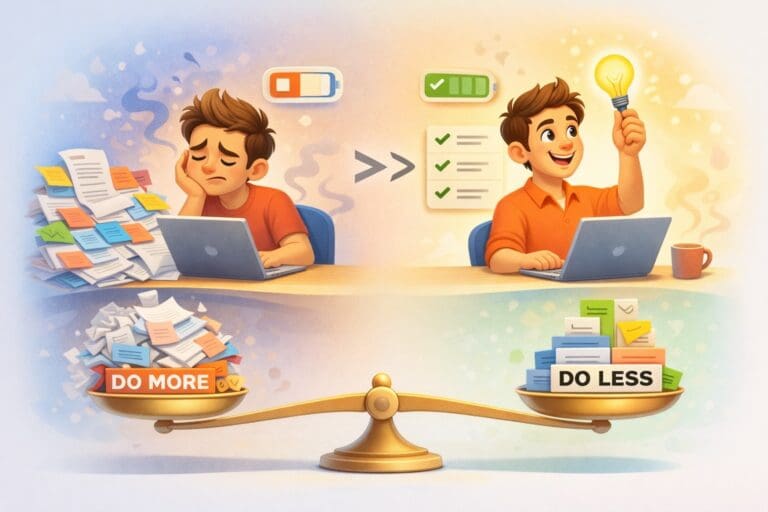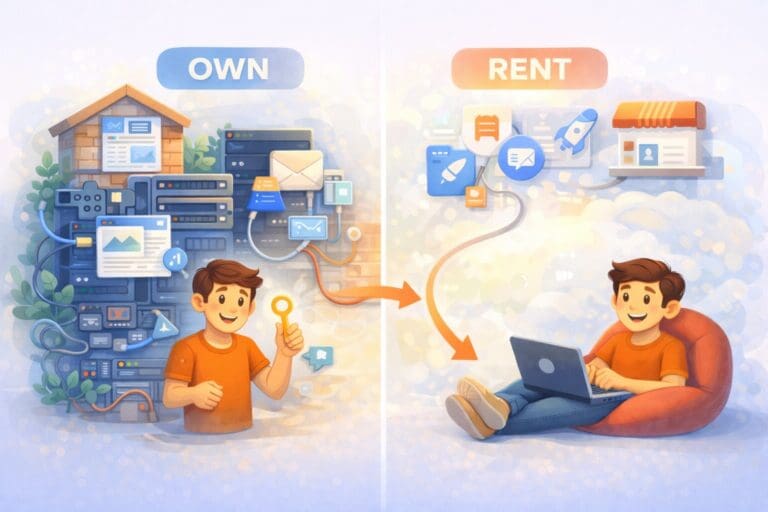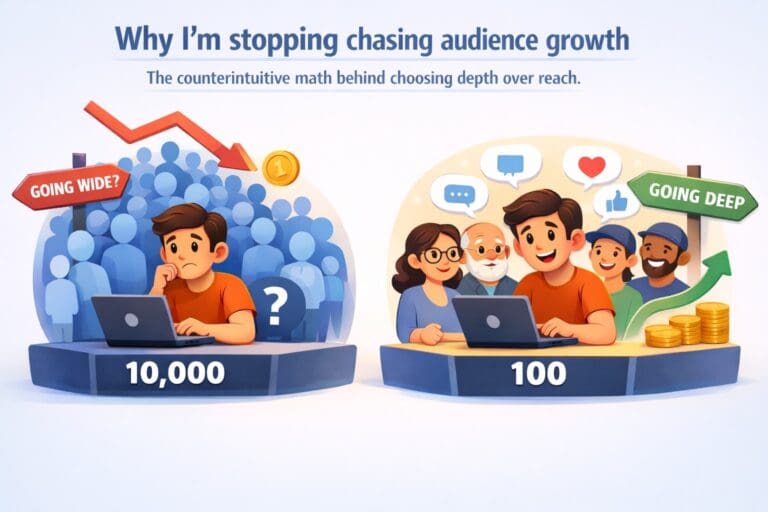Understanding and leveraging emotional intelligence can be your biggest competitive advantage as a leader
Technical expertise alone doesn’t explain why some leaders consistently outperform their equally qualified peers. I’ve watched brilliant strategists struggle to retain top talent while leaders with average technical skills build high-performing teams that consistently exceed expectations.
The difference often comes down to emotional intelligence (EQ) – but not in the way most people think. It’s not just about being nice or showing empathy.
The real power of emotional intelligence in leadership lies in its ability to create sustainable competitive advantages that are nearly impossible to replicate.
Top-performing leaders understand this intuitively. They know that their success isn’t just about making the right strategic decisions – it’s about creating an environment where their teams feel understood, valued, and motivated to give their best.
These leaders consistently achieve better results because they can read situations accurately, respond appropriately, and bring out the best in others.
Most leadership development still focuses primarily on strategic thinking, technical capabilities, and traditional management skills. This creates an extraordinary opportunity for leaders who understand how to leverage emotional intelligence effectively.
In this article, I’ll show you exactly how high-EQ leaders consistently outperform their peers, and more importantly, how you can develop this critical capability in your own leadership style.
The overlooked factor in leadership success
Most organizations have a clear playbook for developing leaders. They focus on strategic planning, financial acumen, and operational excellence. These skills matter – but they’re just table stakes in today’s business environment.
Traditional leadership development misses a crucial element that separates exceptional leaders from average ones. While technical expertise and strategic thinking are important, they don’t explain the substantial performance gaps we see between leaders with similar qualifications and experience.
High emotional intelligence transforms every aspect of leadership. It influences how decisions get made, how teams collaborate, and ultimately, how organizations perform. Leaders with strong EQ create distinct advantages that compound over time.
They spot early warning signs before problems escalate. Their teams speak up when they see issues because they know they’ll be heard.
They make better decisions because they understand the human implications, not just the business logic.
They build stronger relationships, which leads to better information flow and more effective execution.
Most importantly, they create psychological safety – an environment where innovation thrives because people feel secure enough to take smart risks.
Yet many leaders dismiss emotional intelligence as a “soft” skill, focusing instead on more tangible capabilities. This creates a blind spot that limits their effectiveness and holds back their organizations.
Five ways high EQ leaders create exceptional results
Leadership styles vary widely, but high-EQ leaders share certain patterns in how they approach challenges and opportunities. These patterns directly influence their ability to consistently outperform their peers.
They read situations before they escalate. This means picking up on subtle changes in communication patterns, team dynamics, and organizational mood. High-EQ leaders detect and address potential issues before they become significant problems.
They respond rather than react. This might sound simple, but it’s surprisingly rare in high-pressure leadership positions. Instead of immediate emotional responses to challenges, these leaders take time to process situations and approach problems strategically.
They build genuine connections across all levels. High-EQ leaders don’t just network – they create authentic relationships. This means they receive unfiltered information about what’s really happening in their organization, allowing them to make better-informed decisions.
They manage energy, not just time. Emotionally intelligent leaders understand that their mood affects their entire organization. They consciously manage their emotional state, knowing when to show urgency and when to project calm. This emotional regulation helps their teams stay focused and productive, especially during challenging periods.
They make others feel understood. These leaders don’t just listen – they make people feel heard. It’s a subtle but crucial difference that transforms how teams communicate and collaborate.
This ability to understand and navigate emotions creates a ripple effect throughout the organization. Teams led by high-EQ leaders typically show higher engagement, lower turnover, and better performance metrics – not because these leaders are less demanding, but because they create an environment where people want to give their best.
The measurable impact of emotional intelligence
High emotional intelligence in leadership creates tangible, measurable advantages for organizations beyond improved team dynamics. The impact shows up clearly in operational metrics, financial results, and organizational health indicators.
Employee retention provides one of the clearest indicators. Organizations led by high-EQ leaders consistently maintain higher retention rates, particularly among top performers. This translates directly to reduced recruitment costs and maintained organizational knowledge.
Productivity metrics tell an equally compelling story. Teams operating under emotionally intelligent leadership demonstrate higher output with lower burnout rates. They collaborate more effectively, solve problems faster, and implement solutions more successfully.
The financial impact extends beyond obvious metrics. While reduced turnover and higher productivity directly affect the bottom line, EQ’s influence appears in other key areas:
Better customer relationships lead to higher customer lifetime value Improved team collaboration reduces project delays and overruns Stronger employee engagement drives innovation and process improvement Enhanced communication reduces costly mistakes and misalignments
Innovation metrics also show marked differences. Teams feel safer proposing new ideas and taking calculated risks when led by emotionally intelligent leaders. This psychological safety translates into more patents filed, more process improvements suggested, and more innovative solutions implemented.
Change management success rates provide another clear indicator. Organizations with high-EQ leadership successfully implement major changes at nearly twice the rate of their peers. This adaptability becomes increasingly valuable as market conditions and technological capabilities evolve rapidly.
These performance differences compound over time. Much like compound interest in finance, the small advantages created by emotional intelligence accumulate and multiply, creating increasingly significant performance gaps between organizations.
Developing your emotional intelligence advantage
High emotional intelligence isn’t an innate trait – it’s a capability that can be developed through deliberate practice and consistent effort. The key lies in focusing on specific, measurable behaviors rather than abstract concepts.
Start with self-observation. Pay attention to your emotional responses during different situations throughout the day. Notice what triggers strong reactions and how these emotions influence your decision-making process.
Daily reflection creates compound returns. Take five minutes at the end of each day to analyze your key interactions. Which ones went well? Which ones could have gone better? What patterns emerge in your responses?
Feedback becomes crucial for growth. High-EQ leaders actively seek input about their impact on others. They ask specific questions about their communication style, decision-making approach, and leadership presence.
Three core practices consistently improve emotional intelligence:
Practice pause-and-plan instead of react-and-regret. When facing challenging situations, take a moment to consider multiple perspectives before responding.
Focus fully during conversations. Remove distractions, maintain eye contact, and listen to understand rather than to respond.
Monitor your emotional state throughout the day. Learn to recognize when stress, frustration, or other emotions might cloud your judgment.
The development process requires patience. Small improvements in how you handle difficult conversations, process feedback, or manage stress accumulate over time into significant leadership advantages.
Professional relationships offer excellent practice opportunities. Each interaction becomes a chance to better understand others’ perspectives, manage your responses, and build stronger connections.
From good to exceptional: putting EQ into practice
Transforming emotional intelligence from concept to practice requires a systematic approach. Success comes from consistent application in everyday leadership situations.
Regular team interactions offer the perfect testing ground. Start meetings by checking in on your team’s energy levels and concerns. This simple practice builds trust and provides valuable insights into potential issues or opportunities.
Difficult conversations become opportunities for growth. Instead of avoiding challenging discussions, approach them with curiosity. Focus on understanding different perspectives before moving toward solutions.
Build emotional intelligence into your daily routine:
Before important meetings, take a moment to assess your emotional state and set a clear intention for the interaction
Practice active listening in every conversation by focusing entirely on understanding the other person’s perspective
End each day by reflecting on your interactions and their impact
Small adjustments in how you communicate can create significant impacts. Replace “but” with “and” in your responses to acknowledge multiple viewpoints. Use “I notice” statements instead of making assumptions about others’ motivations.
Make emotional intelligence part of your decision-making process. Before finalizing important decisions, consider their emotional impact on your team and organization. This extra step often reveals important factors that purely analytical approaches miss.
Track your progress through observable behaviors and outcomes. Notice how your teams respond differently as you develop stronger emotional intelligence. Pay attention to improvements in collaboration, communication, and results.
The most effective leaders treat emotional intelligence as a fundamental business skill rather than an optional soft skill. They recognize that in today’s complex business environment, the ability to understand and navigate emotions often determines the difference between good and exceptional performance.
Your competitive advantage lies not just in what you know or what you can do, but in how effectively you can understand and work with others. This capability becomes increasingly valuable as organizations face more complex challenges that require strong collaboration and adaptability.
Making emotional intelligence your leadership edge
High emotional intelligence transforms good leaders into exceptional ones by enabling stronger team dynamics, better decision-making, and more sustainable results. Each interaction becomes an opportunity to build trust, understand perspectives, and guide your organization toward better outcomes.
Start implementing emotional intelligence practices today:
Notice your emotional responses during key interactions Practice active listening in every conversation Take time to consider the human impact of your decisions Seek regular feedback about your leadership impact
The most successful leaders don’t treat emotional intelligence as a separate skill – they integrate it into every aspect of their leadership style. This integration creates compounding benefits that show up in team performance, innovation rates, and organizational results.
Take the first step by choosing one aspect of emotional intelligence to focus on this week. Whether it’s better listening, more thoughtful responses, or increased self-awareness, small improvements consistently applied create significant leadership advantages over time.
Strong emotional intelligence isn’t just about being more empathetic – it’s about being a more effective leader. The evidence shows that leaders who master this capability consistently outperform their peers in virtually every meaningful metric.
Most importantly, focus on progress rather than perfection. Every interaction becomes a chance to practice and improve, gradually building the emotional intelligence advantage that defines exceptional leadership.






